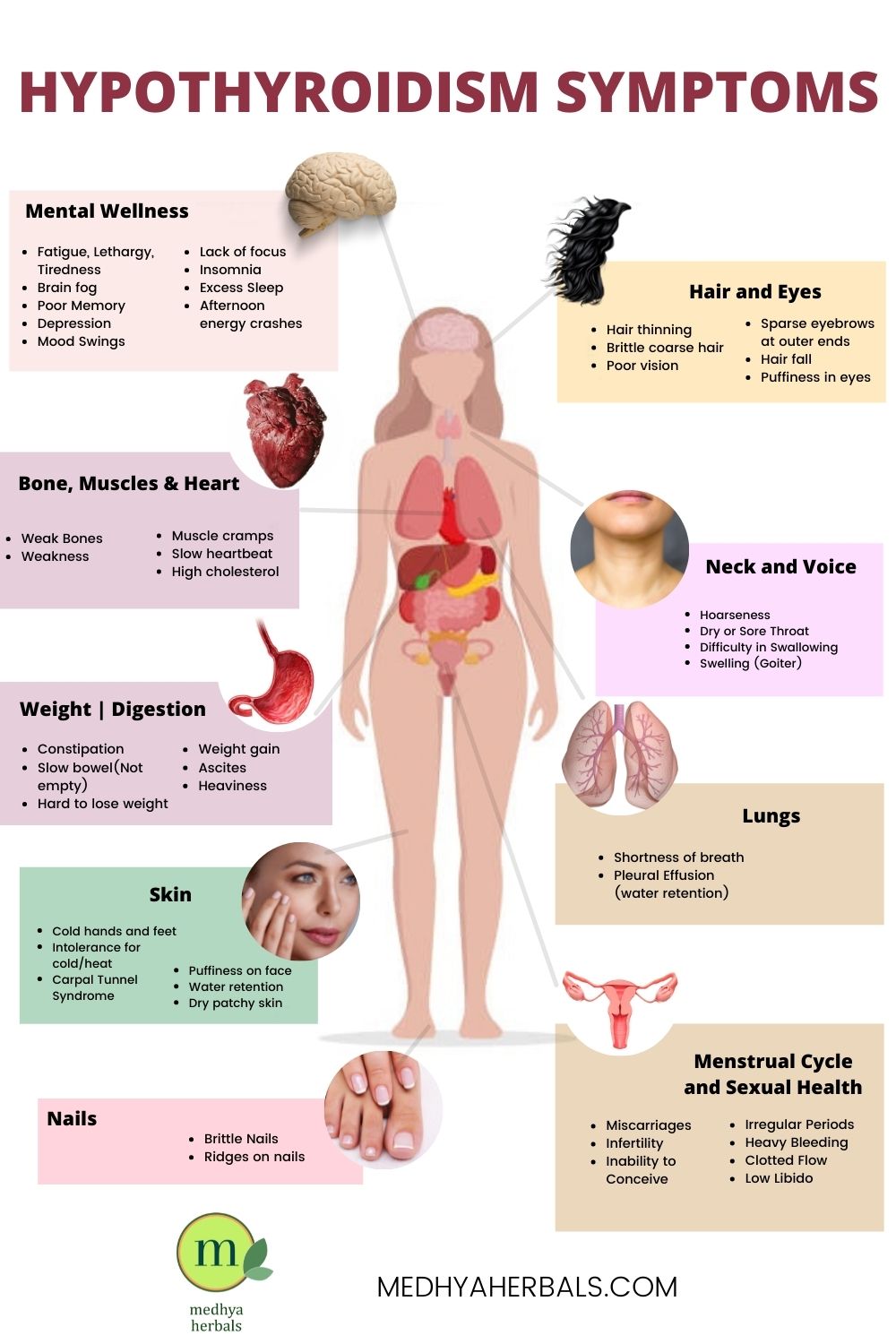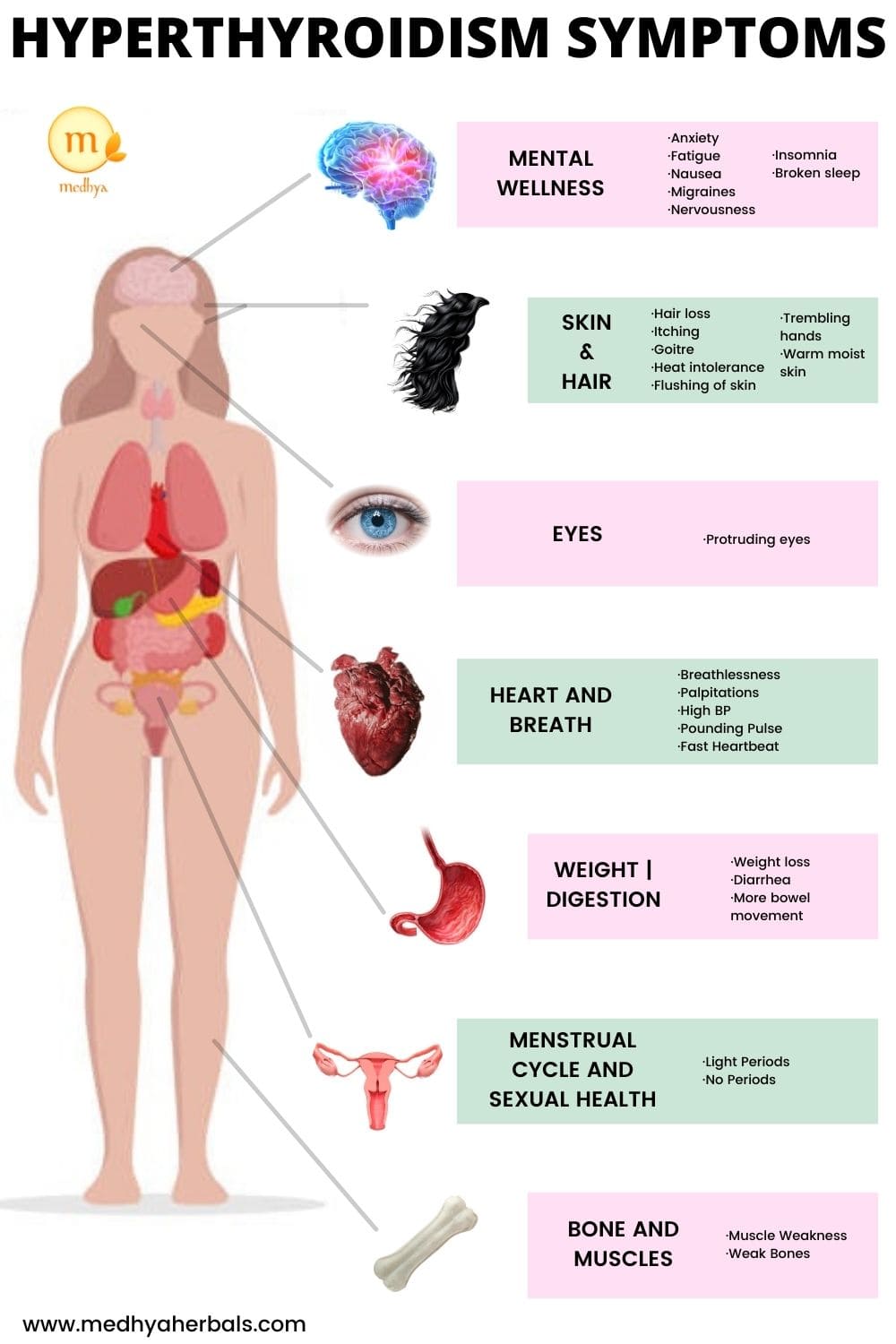Low Thyroid Test Quiz to Know if You Have Hypothyroidism | Underactive Thyroid
Check whether your health symptoms indicate Hypothyroidism, Underactive Thyroid or Thyroid Problems with this 2 min Thyroid Symptoms quiz. For each question, please check the option that's applicable for you. On completion, you will get your results and Ayurvedic diet & lifestyle guidelines to naturally find relief from Thyroid Symptoms.
Why take the Thyroid Symptoms Quiz?
If you are struggling with the wide range of underactive thyroid symptoms and yet trying to get a handle on your health, then thyroid symptoms quiz is the right place to begin.
This health assessment takes into account symptoms of an underactive thyroid in women such as an inability to manage weight, fertility problems, constant fatigue, painful, heavy and irregular periods, hair loss and many more that you are currently trying to resolve.
These are some of the common health symptoms that can arise as a result of nutritional deficiencies as well as an imbalance in thyroid hormones.
What tests are done to Diagnose Underactive Thyroid?
Your thyroid function is usually tested by Blood tests to measure the quantity of thyroid hormones circulating in your blood. However, not all tests are useful in all situations specifically during pregnancy and/or on certain medications.
Following Blood Tests are done to evaluate thyroid function include the following:
1. TSH Test
Your Doctor will check the amount of TSH (thyroid Stimulating Hormone) in your blood first. TSH is a hormone made in the pituitary gland that tells the thyroid gland how much T4 and T3 to make.
- A high TSH level indicates that the thyroid gland is not making enough thyroid hormone (primary hypothyroidism).
- When TSH level is low, it usually indicates that the thyroid is producing too much thyroid hormone (hyperthyroidism).
- Sometimes, low TSH level may result from an abnormality in the pituitary gland, which prevents it from making enough TSH to stimulate the thyroid (secondary hypothyroidism).
- In most healthy individuals, a normal TSH value means that the thyroid is functioning properly.
2. T4 Test
T4 is the main form of thyroid hormone circulating in the blood. Total T4 measures both bound and free hormone (available for use by our body and responsible for action of TSH). The amount of Free T4 changes when binding proteins change in quantity and quality. Thus, blood tests measuring Free T4, either a Free T4 (FT4) or Free T4 Index (FTI) can better indicate the function of thyroid gland.
- High TSH and Low FT4 or FTI indicates primary hypothyroidism due to problems of the thyroid gland.
- Low TSH and low FT4 or FTI indicates hypothyroidism due to a problems in the pituitary gland.
- Low TSH with high FT4 or FTI indicates Hyperthyroidism.
3. T3 Test
T3 tests is done when your Doctor suspects Hyperthyroidism, yet your T4 levels came normal. T3 levels can help to diagnose the severity of the hyperthyroidism as T3 increase for the patients.
- Sometimes, it may happen that one has low TSH but normal levels of FT4 or FTI. In such cases, high T3 indicates Hyperthyroidism.
- T3 testing is not helpful when you suspect Hypothyroidism or an Underactive Thyroid, since it is the last test to become abnormal. Patients can be severely hypothyroid with a high TSH and low FT4 or FTI, but have a normal T3.
Free T3 Test
Free T3 tests is often not reliable and therefore it is not so helpful for Thyroid diagnosis.
4. Reverse T3 Test
Reverse T3 (RT3) is generated from T4, however it is inactive. It is is structurally very similar to T3 but not useful for our body. Your diet and lifestyle factors such as stress, inflammation, poor diet, toxicity, mental stress make your body to overproduce RT3 from T4.
Levels of RT3 thus indicate any health conditions (thyroid or non-thyroid) that disturb T4 to T3 production pathways.
5. Thyroid Antibody Test
In many patients with hypothyroidism or hyperthyroidism, lymphocytes react against the thyroid (thyroid autoimmunity) and make antibodies against thyroid cell proteins. Measuring levels of thyroid antibodies may help diagnose the cause of the thyroid problem. Usually the antibodies that are tested are:
- thyroid peroxidase (Tp) antibody
- thyroglobulin (Tg) antibody
- stimulatory TSH receptor antibody (TSI)
What it means?
- Positive anti-thyroid peroxidase and/or anti-thyroglobulin antibodies in a patient with hypothyroidism result in a diagnosis of Hashimoto’s thyroiditis.
- Positive TSH receptor antibody in a patient with Hyperthyroidism can result in Grave's Disease.
Thyroid Tests
Other than blood tests, you may also need to go through:
- Physical examination of thyroid gland to check for presence of nodules or inflammation
- Thyroid scan via an ultrasound or a radioactive Iodine uptake test
- Your diet and lifestyle that may indicate presence of thyroid triggers
- Family history to see presence of genetic factors
Thyroid Symptoms Checklist
Thyroid presents itself in different ways in different women. You may experience one or more of the health symptoms listed below.
Also, the extent to which a health symptom is present in a women varies depending on the functioning of her thyroid gland and the levels of thyroid hormones in her body.
For example, if you are experiencing underactive thyroid, then you will constantly struggle with fatigue, dryness of skin and scalp, weight gain, joint pain, hair loss and period problems.
However, for hyperthyroidism, you will primarily struggle with weight loss, anxiety, absent periods, dryness, brittleness, weak bones and constant headaches.
Here's Thyroid Symptoms Checklist for you to know whether you fall in the risk category of having Thyroid problems.

- Weight Problems
- Weight Gain or Hard to Lose Weight
- Unexplained, sudden weight loss
- Poor Muscular Strength
- Muscle weakness and/or muscle atrophy
- Fatigue
- Muscle aches, tenderness, and stiffness
- Skin and Hair problems
- Dry Skin
- Hair Loss
- Period Problems
- Short Menstrual Cycle (less than 21 days) leading to Early or Frequent periods
- Heavy Bleeding or Menorrhagia
- Long Periods that last beyond 7 days
- Clotted blood flow during menstruation
- Spotting or Bleeding in between periods
- No periods for more than 2 months
- Irregular periods
- Low menstrual flow
- PMS and period cramps
- Poor Mental Wellness
- Anxiety
- Depression
- Irritability
- Mood Swings
- Poor Fertility
- Inability to conceive
- Miscarriages
- Low sexual drive
- Infertility
- Digestive Problems
- Irregular Digestion and Appetite
- Food Cravings
- Constipation, Bloating and Gas
- Sleep Disorders
- Inability to sleep
- Broken Sleep
- Excessive Sleep
- Body Temperature
- Excessive Sweating and Smelly Sweat
- Frequent urination
- Increased thirst
- Increased sensitivity to cold or heat

Identifying and Working on Your Specific Thyroid Symptoms
Thyroid imbalance symptoms can appear in varying intensity for different women and in different phases of your life. That’s why this health quiz doesn’t just focus on the type of health issue but also how it is affecting you in specific.
Thus, based on your specific level of imbalances; you can adopt a healing diet and lifestyle regimen. You will find all the details once you take the thyroid symptoms quiz and find out your health score.
So, get started and begin your journey to “heal and thrive in your body”.
Thyroid Symptoms often overlap with other Health Issues
A number of Thyroid symptoms often overlap with other hormonal imbalances or nutritional deficiencies such as:
- Vitamin D Deficiency
- PCOS
- Iodine Deficiency
- Protein Deficiency
- Excessive Toxin Build Up in the body
- After you stop taking the Birth Control Pills
- Eating Disorders and Disturbed digestive fire
That is why, it is really difficult to diagnose Underactive Thyroid at home!
However, Thyroid symptoms quiz does help you to identify possibility of an Underactive Thyroid based on the most probable Thyroid symptoms.
Disclaimer: Thyroid Symptoms Quiz is based on Thyroid symptoms, triggers, and signs of Thyroid Disorders that are commonly observed in women.
The purpose of Thyroid Symptoms Quiz is to provide you with the likelihood of Thyroid problems. For Thyroid Diagnosis, you should consult your Doctor.
In case of unusual and serious health issues, you should contact your Doctor and take medical assistance. For Ayurvedic treatment, you can schedule online consultation with Dr. Pawan Bansal at Medhya Herbals.